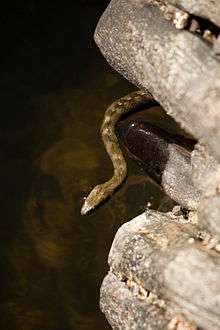Natrix maura
| Natrix maura | |
|---|---|
 | |
| Scientific classification | |
| Kingdom: | Animalia |
| Phylum: | Chordata |
| Subphylum: | Vertebrata |
| Class: | Reptilia |
| Order: | Squamata |
| Suborder: | Serpentes |
| Family: | Colubridae |
| Subfamily: | Natricinae |
| Genus: | Natrix |
| Species: | N. maura |
| Binomial name | |
| Natrix maura (Linnaeus, 1758) | |
| Synonyms | |
Natrix maura is a natricine water snake of the genus Natrix. Its common name is viperine water snake or viperine snake. Despite its common names, it is not a member of the subfamily Viperinae. This nonvenomous, semiaquatic, fish-eating snake was given its common names due to behavioural and aesthetic similarities with sympatric adder species.
Behaviour
The viperine snake looks like an adder and behaves like one. It is known to strike like an adder, but not bite. However, when in water, the viperine snake then looks like a grass snake and hunts its prey in the same way. This snake is diurnal.[1]
Geographic range
The viperine snake is found in southwestern Europe and northwestern Africa. Specifically, N. maura is found in the European countries of: Portugal, Spain, France, northernwest Italy, and even into Switzerland. It has spread to areas of England, as well. It is found in African countries of Morocco, northern Algeria, northwestern Libya, and northern to central Tunisia.[1]
Description

N. maura is gray, brown, or reddish dorsally, with a black zigzag vertebral stripe, and lateral series of black ocelli with yellow centers. The labials are yellow with black sutures. It has a diagonal dark band on each temple, and another behind it on each side of the neck. Ventrally, it is yellow or red, checkered with black, or all black.
The strongly keeled dorsal scales are arranged in 21 rows. The ventrals are 147–160; the anal plate is divided; and the paired subcaudals number 47–72.
Adults may attain a total length of 85 cm (33 inches), with a tail 17 cm (7 inches) long.[2]
Habitat
The viperine snake is found in rivers and lakes, and has also been recorded from areas of brackish water.
See also
References
- 1 2 UIcnmed.org
- ↑ Boulenger GA. 1893. Catalogue of the Snakes in the British Museum (Natural History). Volume I., Containing the Families ... Colubridæ Aglyphæ, part. London: Trustees of the British Museum (Natural History). (Taylor and Francis, printers). xiii + 448 pp. + Plates I-XXVIII. (Tropidonotus viperinus, pp. 235–237).
External links
Further reading
- Arnold EN, Burton JA. 1978. A Field Guide to the Reptiles and Amphibians of Britain and Europe. London: Collins. 272 pp. ISBN 0-00-219318-3. (Natrix maura, pp. 202–204 + Plate 37 + Map 115).
- Linnaeus C. 1758. Systema naturæ per regna tria naturæ, secundum classes, ordines, genera, species, cum characteribus, diferentiis, locis. Tomus I. Editio Decima, Reformata. Stockholm: L. Salvius. 824 pp. (Coluber maurus, new species, p. 219). (in Latin).